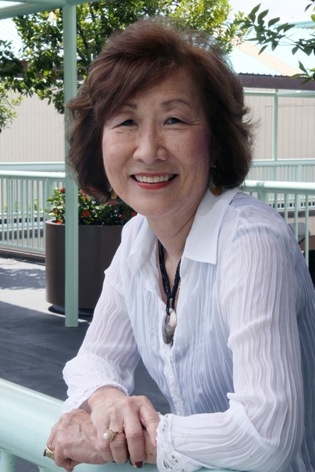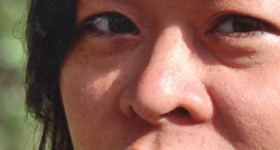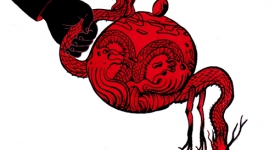Frances
H. Kakugawa, poet and teacher, has woven a lyrical account of her
Hawaiian hometown that reveals the emotional life of Kapoho. With the
sensibilities of a poet, Kakugawa clears the touristy haze on our
visions of Hawaii to show how the Pearl Harbor bombing and a volcano
eruption jolted a destitute young Japanese American girl into living
with introspection and grace.
Kapoho: Memoir of a Modern Pompeii starts
with a bang. The bombing of Pearl Harbor sends Kapoho’s plantation
village into a tailspin of fear, while five-year-old Kakugawa learns the
infuriating ironies of war. “That was the day I learned to be afraid,”
she writes. “That was the day I learned there was an enemy, an enemy who
would wear my face.”
From
this historical vantage point, Kakugawa zooms in on the particulars of
her life. In stark, crystalline prose, Kakugawa dramatizes her struggle:
the desire to escape Kapoho for an elegant life in a world-class city
while retaining Kapoho’s humility and traditions. To escape a life
harvesting sugar canes, first-grader Kakugawa vows to become a writer.
Adorably, she tells her father she is there by mistake -- “I was born in
Emperor Hirohito’s family, and somebody kidnapped me and brought me
here.” In order to actually leave, she realizes she must learn how to
speak like a haole,
a white person, and endure the teasing that would inevitably accompany
this. She stays after school and practices each English word she had
mispronounced by repeating it 20 times. But her classmates surprised
her. “Instead of putting me down for ‘talking like a haole’...Each time I spoke in Standard English, they told me, ‘Yeah, you goin’ college.’”
And
so she does. To afford college, Kakugawa works as the live-in maid for a
family of five, and gains a bewildering initiation into the haole
way of live. For dinner, Kakugawa cooks more rice than they know how to
eat. When a lamp falls and the electricity sputters, Kakugawa, who grew
up without electricity, regards it with terror: “I looked at the
snake-like cord running menacingly into the wall and was afraid of being
electrocuted.” But she is accepted into the family as one of their own.

Frances H. Kakugawa
Kakugawa
constructs the story of her life in a counterpoint, fast-forwarding and
rewinding through chapters while interlacing fables of her fellow
Kapoho dwellers. While this pattern feels dizzying at first, rich
comparisons are implied by the nonlinear design. For instance, Keoni, a
wealthy businessman who abandoned his dreams of becoming a poet, returns
to Kapoho after a volcano eruption has destroyed his native island.
Annoyed by his childhood memories and their emotional power, such as his
father chiseling wood by hand, Keoni dismisses their meaning just as he
neglected poetry for money: He thinks, “I’m out of here, Kapoho, and you can kiss my ass!”
In
contrast, Kakugawa fills her life with poetry and mines her memories
for significance. Haughty as a twentysomething, she claims she raised
herself because her parents aren’t like the affectionate American
families in her novels. Her mother had never hugged Kakugawa, but she
always gave her daughter taxi money in quiet affection. When Kakugawa’s
mother descends into Alzheimers, they hold hands in the mall, and
finally, she inspires someone else’s jealousy with her family’s
tenderness. A teenager marvels, “Look at that. That is so awesome.” When
her mother no longer recognizes her, in a poignant twist, Kakugawa is
finally able to hug and kiss her. “Perhaps I waited until her mind was
no longer there so that I could finally hug her and show her physical
affection without disrespecting and defying the dance we had danced
throughout her life. Or was it my dance alone?” Now enlightened,
Kakugawa accepts the blame.
Bookended
by historical explosions, her memoir ignites with Pearl Harbor and
closes with the volcanic eruption that destroyed Kapoho. Once ashamed of
her Japanese identity in the aftermath of Pearl Harbor, an older Kakugawa, now living in Michigan, finally takes pride in her identity
and mourns for her hometown. Shellshocked by the loss of her physical
home, Kakugawa accepts that whenever someone calls her by her nickname,
Hideko, she will have found Kapoho. Like Pompeii, the village is
preserved by volcanic rock: “Kapoho will always be there, and I’ll be
digging for new treasures and new shock cocoons,” Kakugawa writes. Like
the volcano, Kakugawa has preserved Kapoho’s treasures, but in her
memoir, they are laid bare to any reader who seeks them.
Rebecca Huval blogs and grant writes at the documentary organization Independent Television Service. Her writing has appeared in Mother Jones, The Miami Herald, and McSweeney’s Internet Tendency.









Comments